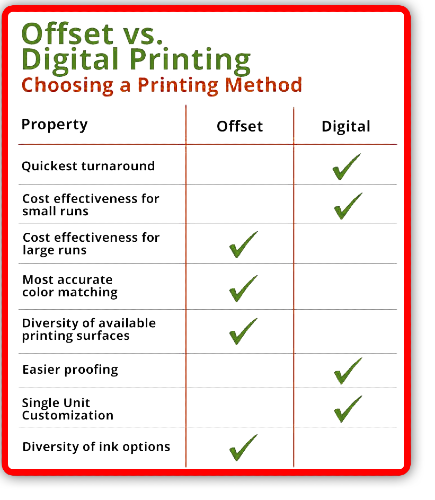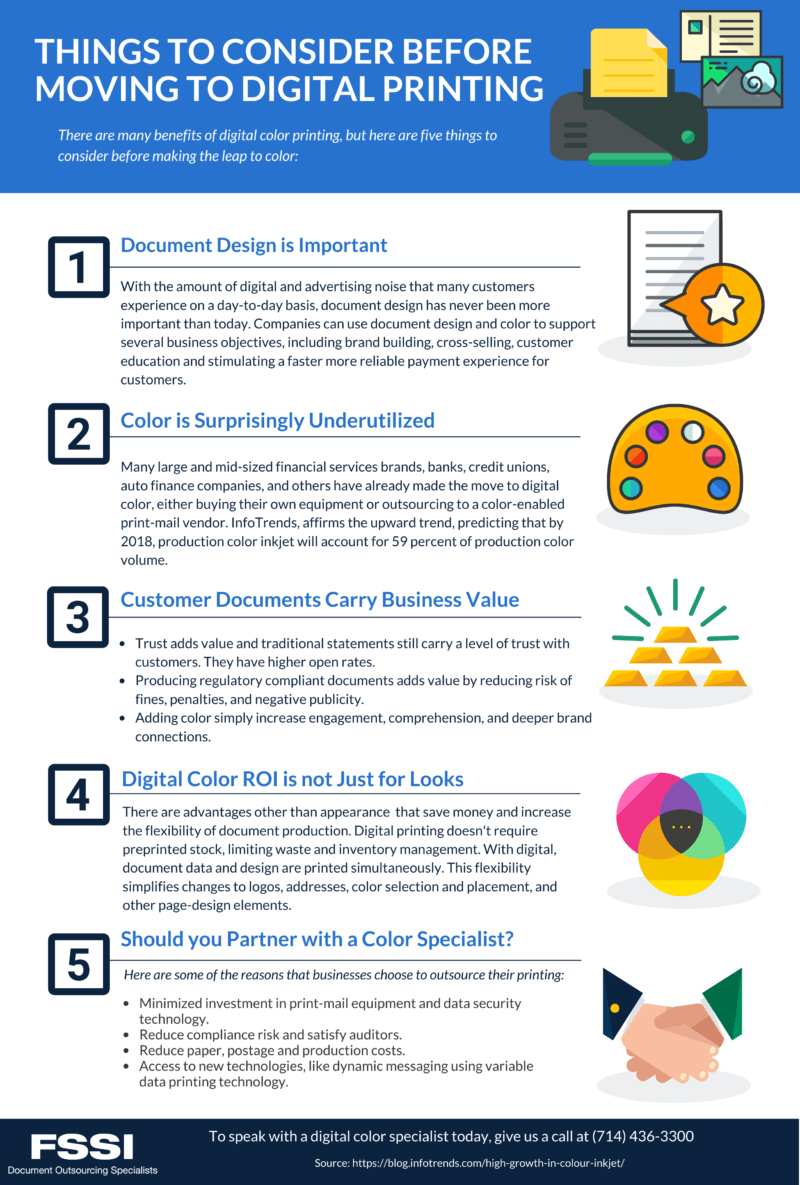Digital Printing Fundamentals Explained
Digital Printing Fundamentals Explained
Blog Article
8 Easy Facts About Digital Printing Explained
Table of ContentsThe Buzz on Digital Printing7 Simple Techniques For Digital PrintingGetting My Digital Printing To WorkGetting The Digital Printing To Work10 Easy Facts About Digital Printing ExplainedThe Basic Principles Of Digital Printing
Variable information printing, such as direct mail with customized codes and addresses, is preferably matched for digital printing. Digital fast printing just requires 4 steps of style, testimonial, printing and binding to obtain every little thing done. Digital quick printing has an unparalleled advantage: print on need.According to PMMI, electronic printing enables brand names and manufacturers to react quickly to client needs while enhancing the supply chain, lowering warehousing cost and waste, and appreciating faster time to market. That all audios fantastic, however exactly how does this innovation do all that? The significant differentiator of these modern technologies is that there are no set up costs and no plates with electronic printing.
The 6-Second Trick For Digital Printing
This results in quicker turnaround time and reduces expense when utilizing digital printing.
Fast production indicates getting your product to market faster. It also indicates it's much easier and faster to make changes later, when you alter a recipe, add a SKU, or develop seasonal packaging. Digital printing is very flexible, so it's simple to make changes to the plan design swiftly. All of it returns to the plates.
More stock can suggest more waste in the future. With traditional printing approaches, short-run printing is simply not feasible. Due to the fact that a wonderful layout can make or break your product, electronic printing consistently produces top notch, clear and vibrant graphics each time. Digital printing on adaptable pouches includes the brilliant, vivid, and accurate graphics that virtually bid customers to reach out and touch them.
Digital printing is the procedure of printing digital-based images straight onto a range of media substratums. There is no requirement for a printing plate, unlike with offset printing. Digital documents such as PDFs or desktop posting files can be sent straight to the digital printing machine to publish on paper, image paper, canvas, fabric, synthetics, cardstock and other substrates.
6 Simple Techniques For Digital Printing
According to PMMI, digital printing enables brands and suppliers to react quickly to client needs while improving the supply chain, minimizing warehousing price and waste, and enjoying faster time to market. That all sounds excellent, but just how does this modern technology do all that? The significant differentiator of these technologies is that there are no set-up fees and no plates with digital printing.
According to Wikipedia, the biggest distinction between electronic printing and More Bonuses typical techniques such as lithography, flexography, gravure, or letterpress is that there is no need to change printing plates in digital printing, whereas in these analog printing methods home plates are continuously changed. This leads to quicker turn-around time and reduces cost when using electronic printing.

Some Ideas on Digital Printing You Should Know
More supply can suggest even more waste down the roadway. With conventional printing methods, short-run printing is just not feasible. Since an excellent style can make or break your product, electronic printing continually produces top notch, clear and vivid graphics each time. Digital printing on flexible bags includes the brilliant, vibrant, and specific graphics that almost beckon customers to reach out and touch them.

According to PMMI, electronic printing permits brand More Bonuses names and producers to react swiftly to consumer demands while improving the supply chain, lowering warehousing expense and waste, and delighting in faster time to market. That all audios wonderful, however exactly how does this innovation do all that? The significant differentiator of these technologies is that there are no set-up charges and no plates with electronic printing.
The Ultimate Guide To Digital Printing
According to Wikipedia, the best distinction in between electronic printing and typical approaches such as lithography, flexography, gravure, or letterpress is that there is no demand to change printing plates in digital printing, whereas in these analog printing techniques the plates are continuously changed. This causes quicker turnaround time and reduces expense when making use of electronic printing.
Rapid manufacturing suggests obtaining your product to market faster. It likewise implies it's less complicated and faster to make adjustments later, when you transform a dish, add a SKU, or create seasonal product packaging. Digital printing is extremely adaptable, so it's simple to make adjustments to the plan style promptly. It all goes back to the plates.

Our Digital Printing Statements
Digital printing is the process of printing digital-based photos directly onto a selection of media substratums. There is no requirement for a printing plate, unlike with offset printing. Digital data such as PDFs or desktop publishing data can be sent out straight to the digital printing machine to publish on paper, picture paper, canvas, fabric, synthetics, cardstock and other substratums.
Report this page